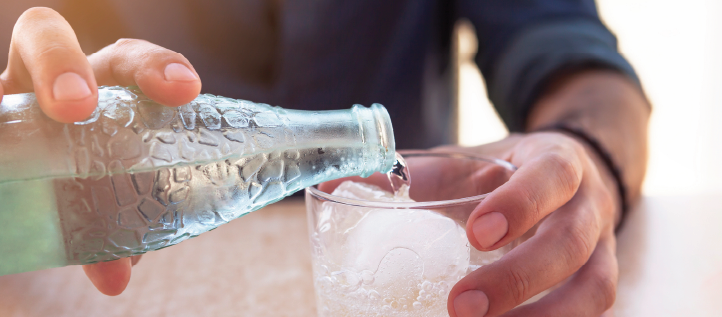Sparkling Water | Does It Affect Your Teeth?

When you aren’t in the mood for plain water, sparkling water might seem like the next best choice. After all, it isn’t sugary soda or juice, right? But it turns out that this water might affect your teeth in negative ways. How can this be possible? We explain it all below.
It Starts with Carbon Dioxide
If you’ve ever wondered where sparkling water gets its bubbles from, the answer is carbon dioxide. That’s why this beverage is also referred to as carbonated water.
Once in your mouth, however, the carbon dioxide turns into carbonic acid as a result of a chemical reaction. While this isn’t a bad thing when it comes to flavor—it makes your drink refreshing and tangy—it does make the beverage more acidic, and that acid might contribute to enamel erosion. Who knew?!
The more you drink this fizzy water, the more you end up exposing your teeth to the acid, especially if you swish it around your mouth before you swallow.
Scary fact: A lot of people like adding lemon or lime juice to carbonated water in order to enhance the flavor, but this simple action increases the acidity. Yikes!
Let’s Look at Some Studies, Shall We?
A drink’s pH can tell you how acidic it is. Soda is really acidic (and, therefore, bad for your teeth), coming in at around 2 on the pH scale. Good ol’ water is around 7. See the difference?
But what about carbonated water? Experts have completed studies to determine the acidity of a variety of popular drinks, including juice, soda, tea, sports drinks, and sparkling water. They found that this water is minimally erosive, with a pH higher than 4. Compare that to sports drinks, which are extremely erosive because their pH tends to be below 3, and it becomes pretty clear that sparkling water is the better choice.
Researchers also discovered that the pH of carbonated water will rise when it goes flat and when it reaches room temperature. Translation: when the water is still nice and bubbly, as well as cold, it’s more damaging to your teeth.
According to the American Dental Association (ADA), however, experts noted that the effects of plain water and sparkling water were similar when they exposed teeth to these beverages in the lab. So, despite the fact that the bubbly water is more acidic than plain water, it’s still a better choice than the sugar-laden options available.
When It Comes to Water, Boring Is Better
Sure, it’s boring and tasteless, but pure water is really the best choice for your chompers. Sparkling water is a better option than sodas, and even orange juice, because it’s way less acidic, but because it’s more acidic than non-carbonated water, it still isn’t the ideal beverage for the health of your teeth.
Tip: Can’t live without bubbly water? Choose sparkling mineral water, which will provide minerals like calcium phosphate that may help counteract some of the damage caused by the acidity of your drink. Cheers to that!
Tip 2: It’s best to avoid sipping on carbonated water throughout the day, constantly exposing your teeth to the acidity. Instead, enjoy fizzy water with a meal, when you’re naturally producing more saliva that can help neutralize some of the acid.
Want to Know the Signs of Enamel Erosion?
We’ve mentioned enamel erosion quite a bit so far, but what are the symptoms of this condition so you can recognize it when it starts to occur?
- Tooth sensitivity when you consume hot or cold foods and drinks
- Notches, particularly at the neck of a tooth (the neck is found between the root and the crown of a tooth)
- Yellowing or darkening of the teeth (this is the dentin becoming increasingly more exposed as the white enamel is worn away)
Note: Erosion tends to develop slowly, so you might not notice it right away. In fact, your dentist may pick up on signs of erosion before you do.
Worried About Your Enamel? Talk to Your Dentist!
In addition to drinking carbonated water in moderation, and avoiding water with added sugar and citrus flavoring, see your dentist regularly to help maintain the health of your enamel. Your dentist can evaluate your teeth to see if erosion is a problem and if cavities have formed in the outer layers of your pearly whites. Plus, this is a great opportunity to ask a pro about steps that you can take daily to keep your enamel as strong as possible for many years to come.
